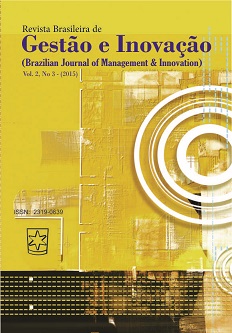MARKETING SENSORIAL NA COMUNICAÇÃO DE MARCA: UM ENSAIO TEÓRICO
Keywords:
Estratégia de Marketing, Marketing Sensorial, Comunicação Sensorial, Comunicação de Marca.Abstract
O marketing sensorial compreende o uso de estímulos sensoriais na experiência ao cliente para criar uma identidade e imagem que atenda ao propósito da marca. Este ensaio discute o uso de estratégias de marketing sensorial na comunicação de marca e apresenta uma proposta de modelo conceitual de aplicação do marketing sensorial no processo de construção da identidade de marca. Para tanto, um levantamento da produção científica sobre o tema foi realizado em âmbito nacional e internacional até o ano 2014, nas bases de dados Ebsco, Spell, Scielo, Domínio Público, Scopus e ISI Web of Knowlodge, contendo a palavra Marketing Sensorial no título, resumo ou palavra-chave do estudo. Os resultados mostram que há ainda poucos estudos acadêmicos sobre o tema, principalmente no âmbito do processo de comunicação da marca, e que pedominam estudos na área da psicologia/comportamento do consumidor e que os estudos analisam a influencia de aspectos sensoriais na atitude e comportamento do consumidor, e envolvem a aplicação de estratégias de marketing sensorial em produtos, marcas e ambientes de varejo. O estudo contribuiu para ampliar o conhecimento sobre o tema, para identificar direcionamentos para futuros estudos acadêmicos e para a proposição de um modelo conceitual sobre a aplicação do marketing sensorial no processo de construção da identidade de marca.
DOI: 10.18226/23190639.v2n3.01
Downloads
Published
How to Cite
Issue
Section
License
The author must guarantee that:
- there is full consensus among all the coauthors in approving the final version of the document and its submission for publication.
- the work is original, and when the work and/or words from other people were used, they were properly acknowledged.
Plagiarism in all of its forms constitutes an unethical publication behavior and is unacceptable. Revista Brasileira de Gestão e Inovação has the right to use software or any other method of plagiarism detection.
All manuscripts submitted to RBGI - Revista Brasileira de Gestão e Inovação go through plagiarism and self-plagiarism identification. Plagiarism identified during the evaluation process will result in the filing of the submission. In case plagiarism is identified in a manuscript published in the journal, the Editor-in-Chief will conduct a preliminary investigation and, if necessary, will make a retraction.
This journal, following the recommendations of the Open Source movement, provides full open access to its content. By doing this, the authors keep all of their rights allowing Revista Brasileira de Gestão e Inovação to publish and make its articles available to the whole community.
RBGI - Revista Brasileira de Gestão e Inovação content is licensed under a Creative Commons Attribution 4.0 International License.
Any user has the right to:
- Share - copy, download, print or redistribute the material in any medium or format, linking to RBGI site.
- Adapt - remix, transform and build upon the material for any purpose, even commercially.
According to the following terms:
- Attribution - You must give appropriate credit, provide a link to the license, and indicate if changes were made. You may do so in any reasonable manner, but not in any way that suggests the licensor endorses you or your use.
- No additional restrictions - You may not apply legal terms or technological measures that legally restrict others from doing anything that the license permits.
#RBGI







